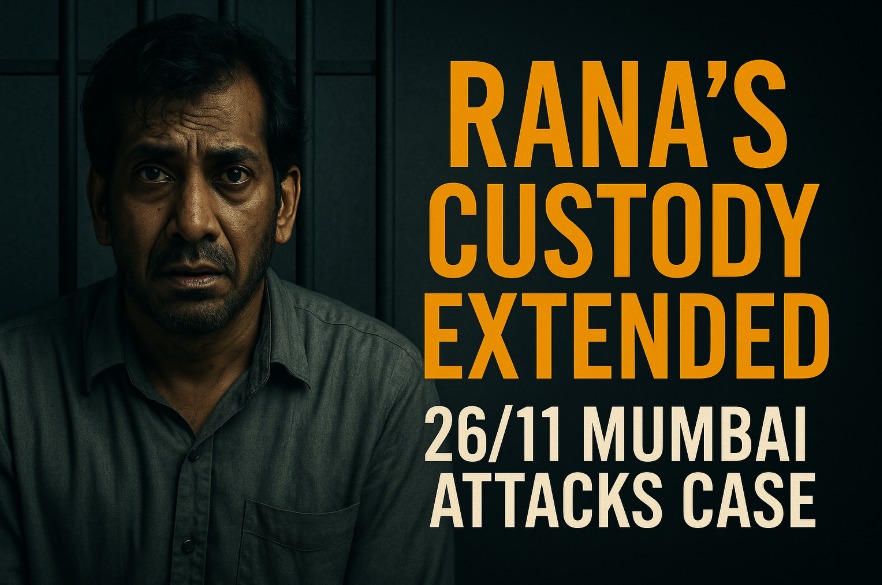Key Accused in 2008 Mumbai Attacks to Remain Behind Bars Until July 9
In a significant development in the long-pending investigation into the 2008 Mumbai terror attacks, a Delhi court on Thursday extended the judicial custody of Tahawwur Hussain Rana — a Pakistani-Canadian businessman accused of aiding in the deadly assault — till July 9.
Rana, who is currently being held at Tihar Jail, appeared before the court via video conference. In addition to the seriousness of the charges, his legal team’s health-related concerns also brought attention to the court proceedings.
Health Issues Take Center Stage
Rana’s attorney told the judge during the hearing that his client has been dealing with health issues while in court custody. Given this, the court mandated that by June 9, Tihar Jail officials submit a comprehensive medical report outlining Rana’s present condition and any necessary medical interventions.
On the same day, the court also consented to consider a request for authorization for Rana to speak with his relatives.
Who is Tahawwur Rana? A Background
Tahawwur Hussain Rana, once a practicing military doctor in Pakistan, later settled in Canada and the United States, where he ran an immigration services firm. He has long been suspected of having played a significant supporting role in the planning of the 26/11 Mumbai attacks, however, regardless of his professional identity.
David Coleman Headley, a Pakistani-American agent who carried out reconnaissance on multiple targets hit during the 2008 siege, is accused of receiving his cover and travel arrangements from him. These included the Chabad House, the Oberoi Trident, and the Taj Mahal Palace Hotel, all of which saw horrifying violence over the course of four days, leaving 175 people dead and more than 300 injured.
In April 2025, after a long legal fight in the United States, Rana was finally sent back to India. The U.S. government made this decision for several reasons, like concerns about his safety and the fact that he had already faced legal action in the U.S. before. U.S government opposed the extradition order. Supreme Court rejected his last appeal, paving the way for his transfer to Indian authorities.
After arriving in India, Rana was arrested by the National Investigation Agency (NIA) and brought before the Patiala House Court, which has been managing the case ever since.
The Case’s Present State: Prospects for the Future
Analysis of Rana’s role in the plot is still ongoing. According to investigators, he voluntarily assisted Headley in obtaining sensitive intelligence for Lashkar-e-Taiba, the Pakistan-based terrorist group responsible for the 26/11 attacks, and was fully aware of the motivations behind Headley’s trips to India.
Now that Rana is in Indian custody and his health is being tracked. The court’s decision regarding his family visitation rights and any additional bail requests will likely determine the prosecution’s next course of action.
For now, the court has extended his stay in jail and will resume hearings on June 9, when the jail authorities are expected to present the medical report and address the communication request.
Is Justice Getting Nearer?
One of the darkest periods in India’s recent history is still the 2008 Mumbai attacks. The coordinated attacks, which were carried out by Pakistani terrorists with heavy weapons, were widely denounced worldwide. Many conspirators are still at large, despite the fact that some of the offenders were apprehended, such as Ajmal Kasab, the only surviving shooter who was put to death in 2012.
Regardless of how many years have gone by, Indian authorities may be making a fresh attempt to hold everyone accountable with Rana’s extradition and ongoing judicial custody.
AUTHOR
Pragya Jakhar is a second-year Lovely Professional University student pursuing a B.A. LL.B. (Hons.). Human rights and constitutional law particularly interest her. Pragya likes to write about legal subjects and is committed to improving and making the legal system more accessible to all.
Throughout the years, she has written numerous articles that examine important legal issues, and her growing comprehension of the operation of the law, both in books and in practice, allows her to contribute perceptive opinions to academic and policy discussions. She enjoys keeping up with news and significant court decisions.

